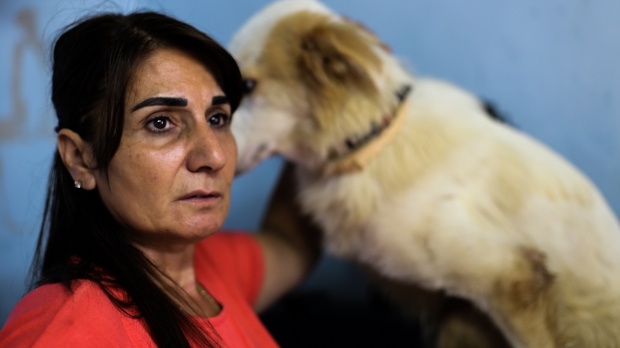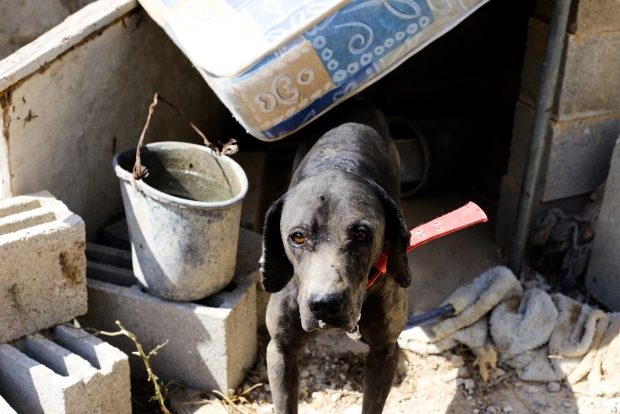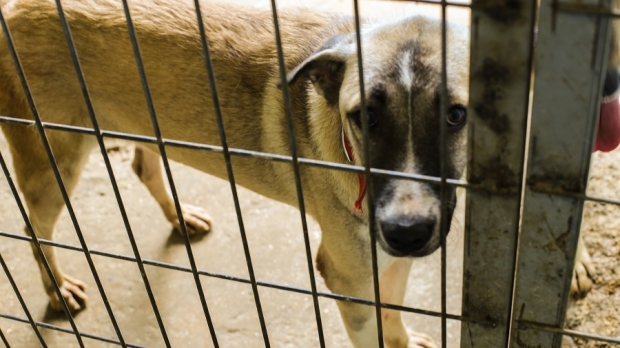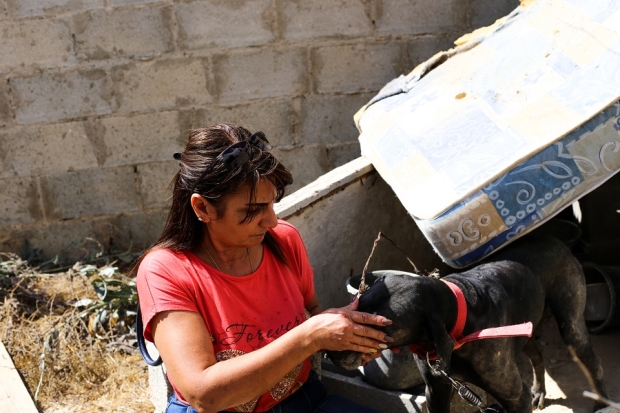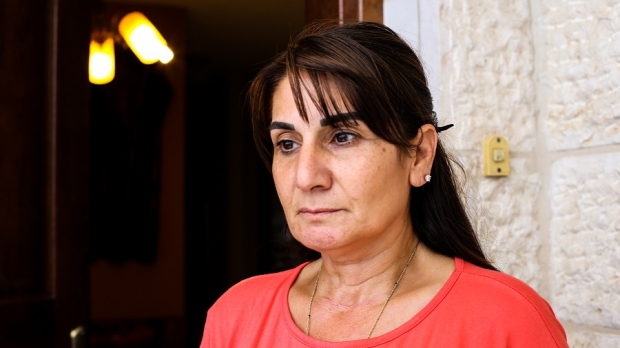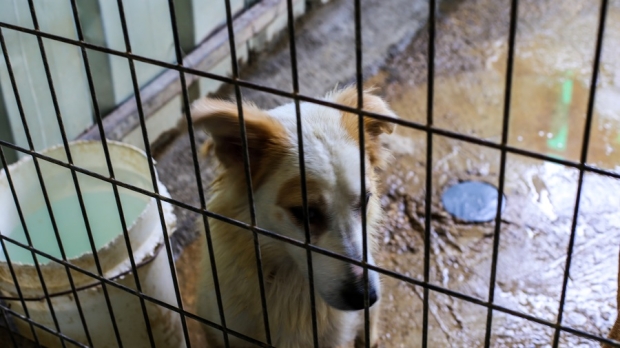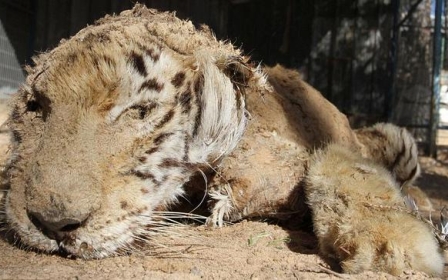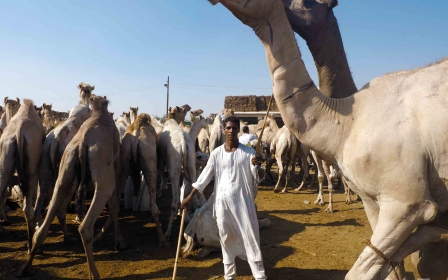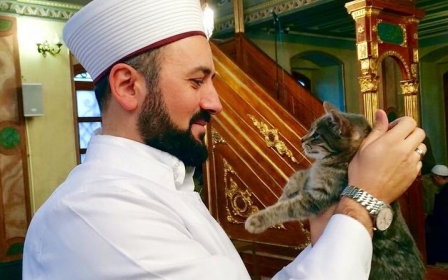Meet the Palestinian woman dedicating her life to saving stray dogs
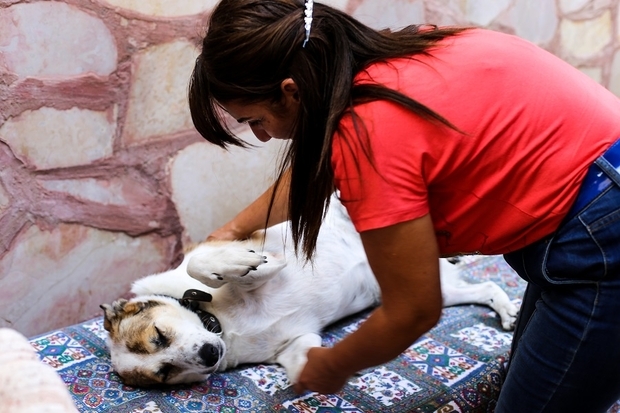
BETHLEHEM, Occupied West Bank - Hundreds of stray dogs usually go unnoticed as they roam around the West Bank. Daily life is already overwhelming for many Palestinians, who have to contend with harrassment and abuse under Israel’s 50-year military occupation, according to rights organisations.
But for Palestinian Diana Babish, the dogs have become her life’s work. After 20 years working as a bank manager, she decided to quit her job and dedicate all her time to saving dogs.
She greets the dogs with the Arabic word habibi (my love) and never shies away from showering them with hugs and kisses.
'In all of my life, I have never been scared of animals. It’s people who scare me'
- Diana Babish, founder of the Animal and Environment Association
“I saw many dogs being abused and tortured,” Babish tells Middle East Eye. “Many people here are taught not to have compassion for animals. It’s like they believe [the animals] cannot feel what is happening to them.”
Babish was determined to challenge this mindset. “I wanted to change the mentality of people and raise awareness among different sectors of the population,” she explains. “I want people to know that animals are a part of our family. They are a creation of God. They should be respected.”
Locals notify her whenever they see a dog in need of help. Her phone is constantly ringing and vibrating with Facebook Messenger notifications.
People think that human beings are the only and most important things living in the universe
- Diana Babish, founder of the Animal and Environment Association
Babish ventures out into the streets in the day and night - usually alone - in search of wounded and sick dogs. During a recent night-time rescue mission that MEE accompanied her on, Babish ducked between alleys and ventured into unlit open areas, where the ground is buried under heaps of trash. Roaming around alone at night does not worry Babish.
“In all of my life, I have never been scared of animals. It’s people who scare me,” she says.
Tireless advocate
According to Babish, West Bank municipalities shoot dogs and allegedly place Rodenticida poison mixed with meat around the streets and in areas frequented by stray dogs in order to kill them off.
She began her endeavour by registering the Animal and Environment Association as a non-profit, and then searched for a space to house and shelter the dogs. At first she rescued three dogs and rented two structures that used to house sheep, located near her home in Beit Sahour, a municipality in the Bethlehem district.
“But the number of dogs continued to increase,” Babish says.
She then repurposed the second floor of her brother’s house, which is still being built, to shelter 40 dogs.
Babish tirelessly campaigned for the building of a shelter in Bethlehem. She contacted the Greek Orthodox church, the Waqf - the Islamic endowments organisation - and members of local municipalities to garner support for a dog shelter, but to no avail. However, a year and a half ago, her luck changed when Hani Hayek, the former mayor of Beit Sahour, offered her land to establish a temporary shelter.
Through friends, small shops and companies, Babish was able to raise money to build the shelter and kennels, while others donated supplies. Yet it was still not enough to accommodate all of the dogs.
According to Babish, despite the municipality's initial support for a dog shelter, it continued the shooting and poisoning campaigns anyway.
'I started the project to show people how to deal with street animals in a humane way, not with poison or shooting'
- Diana Babish
She has managed to rescue some 300 street dogs so far and currently shelters approximately 40 dogs at her facility, all of which have been vaccinated and fixed. Babish recently partnered with Palestinian veterinarian Dr Mamoun Mahmoud, who provides free vaccination services.
Because of a lack of space, the shelter cannot accommodate all of the stray dogs in the West Bank. Therefore, Babish gives priority to sick and injured dogs.
‘She has always loved animals’
When the dogs first come to the shelter, many are infested with ticks and fleas. Some have diseases, such as rabies, and others are starving or severely wounded from being tortured.
Babish separates the recently rescued from the others until they can be vaccinated or treated. For the more severe cases, Babish nurtures them at her home in Beit Sahour until they are healthy enough to be transferred to the shelter.
'[My father] believes the dogs should just remain on the street'
- Diana Babish
When she runs out of room at the shelter, locals and Israelis volunteer to temporarily foster the dogs. Additionally, local restaurants and wedding halls donate leftover food.
“If I don’t help them, no one will," she adds.
Babish’s mother, Janet Hazboun, says she was not surprised when her daughter started the project, noting that even as a child Diana would take care of cats around their former home.
'It’s like [people] believe [the animals] cannot feel what is happening to them'
-Diana Babish
“She has always loved animals,” she says. “I support what she's doing. She’s giving love and compassion to the animals, and we don’t always see this in Palestine.”
Not everyone in her family agrees. Babish and her father have stopped speaking to each other because he opposes her work.
“He believes the dogs should just remain on the street and doesn’t support what I am doing,” Babish says.
‘It’s not right’
Back in July, Babish met with several West Bank municipality leaders to discuss the shooting and poisoning of stray dogs.
Makram Qumisyeh, deputy mayor of the Beit Sahour municipality, who was present at the meeting, told MEE that he was “not aware” of the municipality using poison to kill street dogs. “We all agree that poisoning the dogs is not the right method for solving this issue.”
'We cannot prioritise animals at the expense of the lives and safety of humans'
- Makram Qumisyeh, deputy mayor of Beit Sahour municipality
According to Qumisyeh, the municipalities have agreed that shooting the stray dogs is the most effective tactic to solve the issue in the short-term.
“These dogs are attacking people. We cannot prioritise animals at the expense of the lives and safety of humans," he says.
The shooting campaigns are referred to as “mercy killings” by the municipality. However, the dogs do not always die after being shot.
Just recently Babish rescued a dog in Beit Sahour who had been shot in the leg.
“He was in such a terrible condition,” Babish says. The dog was left bleeding on the street for more than a week. It got to the point where there were maggots in the wound.
Babish brought it home, cleaned the injury, and then took it to a clinic in Israel. She says she spent thousands of dollars on treatment, but the dog’s leg has since been amputated.
“Shooting the dogs is not the right way to handle this situation,” she says. “People need to teach their children to respect them. This is the way we will solve this.”
“People must realise that animals also feel. They have a mind. They can think. They can understand," she adds.
Babish admits that some of the stray dogs can be aggressive, but she attributes this to the harsh environment they face living on the streets.
'People need to teach their children to respect the animals'
- Diana Babish
According to Qumisyeh, a committee was formed at the meeting to organise a long-term goal of developing a shelter that can accommodate stray dogs throughout the West Bank. Yet the project seems to have stagnated.
“Someone needs to take the lead for the project to happen,” Qumisyeh says, noting that it would not be Beit Sahour because this issue is not "only our responsibility".
‘Dogs are not political’
The most controversial part of Babish’s project is her partnership with Israeli clinics.
Since many Palestinians in the West Bank are refugees, displaced from their lands in the Nakba (Catastrophe) during Israel’s establishment in 1948, mistrust runs deep towards Israelis.
“The animal issue has to be separated from the political issue,” Babish explains. “We should not mix politics with saving lives... These animals need help. They need medication. They need care. They need love. This is what I am focusing on.”
'We should not mix politics with saving lives'
- Diana Babish
Babish says she has, however, experienced “great compassion” from Israelis regarding her project. Around six Israeli clinics and one hospital provide her with discounts for treating the dogs and lend their services “on credit” when she lacks the funds to pay.
According to Babish, local Palestinian clinics lack much of the equipment and facilities needed to treat many of the severe cases, so she has no other option.
To put some of her dogs up for adoption and lessen the number at her shelter, Babish has recently started to coordinate with an animal shelter and rescue facility in Israel.
Although Babish’s work is not political, it does not mean her work has been untouched by the Israeli occupation.
Israeli policies mandate that all Palestinians with a West Bank ID need an Israeli permit to visit Jerusalem or Israel.
Babish is usually able to obtain an Israeli permit, but on several occasions her request for access was denied by Israeli authorities, and she could not transfer the dogs across the checkpoints to clinics in Israel to receive treatment.
Despite these challenges, the most pressing concern for Babish is the lack of funds to sustain the project. Babish says the small donations she receives help “but it’s not enough”.
On top of this, Qumisyeh says that the municipality will soon be removing Babish from the donated land because nearby residents have been complaining of loud barking and an “unpleasant smell”. He adds that the municipality also has plans to build a street through the area.
She has asked for more time to find an alternative location for the shelter, but funds remain an obstacle.
“People think that human beings are the only and most important things living in the universe,” Diana says. But according to her Christian beliefs, she adds, "God created animals before he created human beings."
'These animals are voiceless. We have to speak on their behalf'
- Diana Babish
"This means that animals are just as important as humans. We have to care for God’s creations. Existence is for a purpose, and we do not have the right to kill them," she adds.
Despite the municipality's decision, Babish says she has created a model for Palestine and has received local support for expanding the project to other districts in the West Bank.
“These animals are voiceless. We have to speak on their behalf and figure out a way to solve these issues through humane policies that respect animals."
This article is available in French on Middle East Eye French edition.
Middle East Eye propose une couverture et une analyse indépendantes et incomparables du Moyen-Orient, de l’Afrique du Nord et d’autres régions du monde. Pour en savoir plus sur la reprise de ce contenu et les frais qui s’appliquent, veuillez remplir ce formulaire [en anglais]. Pour en savoir plus sur MEE, cliquez ici [en anglais].


